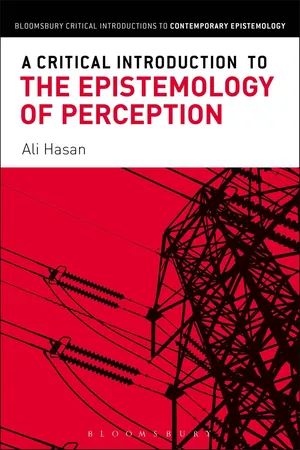
- 208 pages
- English
- PDF
- Available on iOS & Android
A Critical Introduction to the Epistemology of Perception
About This Book
We ordinarily take it as obvious that we acquire knowledge of our world on the basis of sensory perception, and that such knowledge plays a central cognitive and practical role in our lives. Upon reflection, however, it is far from obvious what perception involves and how exactly it contributes to our knowledge. Indeed, skeptical arguments have led some to question whether we have any knowledge, or even rational or justified belief, regarding the world outside our minds. Investigating the nature and scope of our perceptual knowledge and perceptually justified belief, A Critical Introduction to the Epistemology of Perception provides an accessible and engaging introduction to a flourishing area of philosophy. Before introducing and evaluating the main theories in the epistemology of perception, Ali Hasan sets the stage with a discussion of skepticism, realism, and idealism in early modern philosophy, theories of perceptual experience (sense-datum theory, adverbialism, intentionalism, and metaphysical disjunctivism), and central controversies in general epistemology. Hasan then surveys the main theories in the contemporary debate, including coherentism, abductivism, phenomenal conservatism or dogmatism, reliabilism, and epistemological disjunctivism, presenting the motivations and primary objections to each. Hasan also shows how to avoid confusing metaphysical issues with epistemological ones, and identifies interesting connections between the epistemology and metaphysics of perception. For students in epistemology or the philosophy of perception looking to better understand the central questions, concepts, and debates shaping contemporary epistemology, A Critical Introduction to the Epistemology of Perception is essential reading.
Frequently asked questions
Information
Table of contents
- FC
- Half title
- Bloomsbury Critical Introductions to Contemporary Epistemology
- Title
- Copyright
- Dedication
- Contents
- Preface
- 1 Skepticism and foundationalism in early modern philosophy
- 2 Realism, idealism, and common sense
- 3 Perceptual experience
- 4 An introduction to contemporary epistemology
- 5 Coherentism
- 6 Abductivism
- 7 Phenomenal conservatism
- 8 Access internalism, mentalism, and reliabilism
- 9 Epistemological disjunctivism
- Conclusion
- Notes
- References
- Index